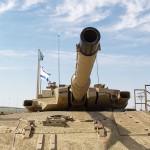 The latest upsurge in the Israel-Gaza conflict looked a lot like ones in the past. Palestinian terrorists planned a new attack on Israel, Israel responded by targeting terrorists behind it, the Palestinians reacted with a massive rocket barrage at Israeli civilians, Israel bombed terror targets in response and so on. A calm was finally reached, broken sporadically with renewed rockets and will eventually quiet down.
The latest upsurge in the Israel-Gaza conflict looked a lot like ones in the past. Palestinian terrorists planned a new attack on Israel, Israel responded by targeting terrorists behind it, the Palestinians reacted with a massive rocket barrage at Israeli civilians, Israel bombed terror targets in response and so on. A calm was finally reached, broken sporadically with renewed rockets and will eventually quiet down.
But the similarity doesn’t make it bearable, and the “quiet” period after the ceasefire has been particularly troubling. Terrorists in Gaza are playing a dangerous game here—this escalation in rockets and other terror could lead to another major Gaza conflict that no one wants.
The latest conflict caught the eyes of IDF officials for all the wrong reasons. An article by the Israeli news source Ynet reported an army official as terming the rocket fire as a “dramatic development in terms of the quantity and rate of the fire.”
In a recent serious escalation, last August, 191 rockets were fired for the entire month, the bulk of which came in a week. This time, more than 220 rockets have been fired in less than a week, and over 200 in just four days.
And the “quiet” afterwards has been no less troubling. In recent days, as happened in August, longer-range missiles have been fired at Israel after a ceasefire was reported. This time, at least one grad rocket was launched at Beersheba, the largest city in Israel’s south—the region’s capital, as it were.
It remains to be seen if such attacks will indeed become as routine as the sporadic launchings at the Gaza-vicinity communities were. The grad rockets are harder to acquire and effectively more “expensive” to launch than the smaller and less deadly Qassam rockets.
However, the bigger rockets’ impact is more serious. Not only can they cause more damage and death, but even when the Iron Dome missile defense system intercepts them, the communities have to act more cautiously.
School was canceled in some communities in the south in light of the rocket fire, for example. If more communities have to react this way, the economic and psychological impact is even more widespread. Instead of tens of thousands of Israelis suffering and insufferable reality, hundreds of thousands are at risk of rocket attacks.
Israel cannot long abide such a scenario. Part of why they endured years of attacks and thousands of rockets before launching Operation Cast Lead in Gaza is the impact was smaller in scope.
This is not to say that Gaza-vicinity communities like Sderot are any less valuable than Beersheba. Rather, Israel has been forced into a tragic cost-benefit analysis: The only way to slow down the rockets for a long period of time is to launch a full-blown war, complete with ground troops. Such a step is obviously a worst-case, last-option scenario.
So Israel waited years to finally pull the trigger—and when they did it was awful, terrible—and effective. Gaza terrorists decreased their rocket attacks dramatically in 2010.
But 2011 saw an uptick in attacks, and included the multi-stage terror attack in Israel’s south in August, which led to the rocket barrage. The latest round was also sparked by southern-focused terror: Israel assassinated a terror leader involved in planning another attack via the Israel-Egypt border. The terrorists then reacted by firing the rockets, and tensions were back up.
The IDF made clear threats to escalate their response to the terror rockets beyond airstrikes if the attacks didn’t stop, including in an interview with The Mideast Update. Those threats ultimately proved unnecessary, thankfully.
But how long will those threats remain words? The Israel-Egypt border is becoming more and more tense due to an decrease in effective security in the Sinai and a subsequent increase in terrorist mobility, and rocket attacks have occurred in greater numbers than in the past.
Should the range of the rockets continue to endanger a million Israelis on anything resembling a routine basis, the IDF will not be able to abide the situation for long. At some point, another major operation will be needed, with tragic results once more. IDF officials realize it, as do Israeli politicians.
So on behalf of innocent Israelis, Gazans and an already tense region, one can only hope and pray the terrorists realize it too.
(By Joshua Spurlock, www.themideastupdate.com, March 16, 2012)
